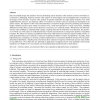Free Online Productivity Tools
i2Speak
i2Symbol
i2OCR
iTex2Img
iWeb2Print
iWeb2Shot
i2Type
iPdf2Split
iPdf2Merge
i2Bopomofo
i2Arabic
i2Style
i2Image
i2PDF
iLatex2Rtf
Sci2ools
223
click to vote
CSDA
2016
2016
Fast computation of large scale marginal extremes with multi-dimensional covariates
Safe and reliable design and operation of fixed and floating marine structures often located in remote and hostile environments is challenging. Rigorous extreme value analysis of meteorological and oceanographic data can greatly aid the design of such structures. Extreme value analysis is typically undertaken for single spatial locations or for small neighbourhoods; moreover, non-stationary effects of covariates on extreme values are typically accommodated in an ad-hoc manner. The objective of the work summarised here is to improve design practice by estimating environmental design conditions (such as return values for extreme waves, winds and currents) for a whole ocean basin, including additional covariate effects (such as storm direction) as necessary, in a consistent manner. Whole-basin non-stationary extreme value modelling is computationally complex, requiring inter-alia the estimation of tail functions, the parameters of which vary with respect to multi-dimensional covariat...
| Added | 01 Apr 2016 |
| Updated | 01 Apr 2016 |
| Type | Journal |
| Year | 2016 |
| Where | CSDA |
| Authors | Laks Raghupathi, David Randell, Kevin Ewans, Philip Jonathan |
Comments (0)

